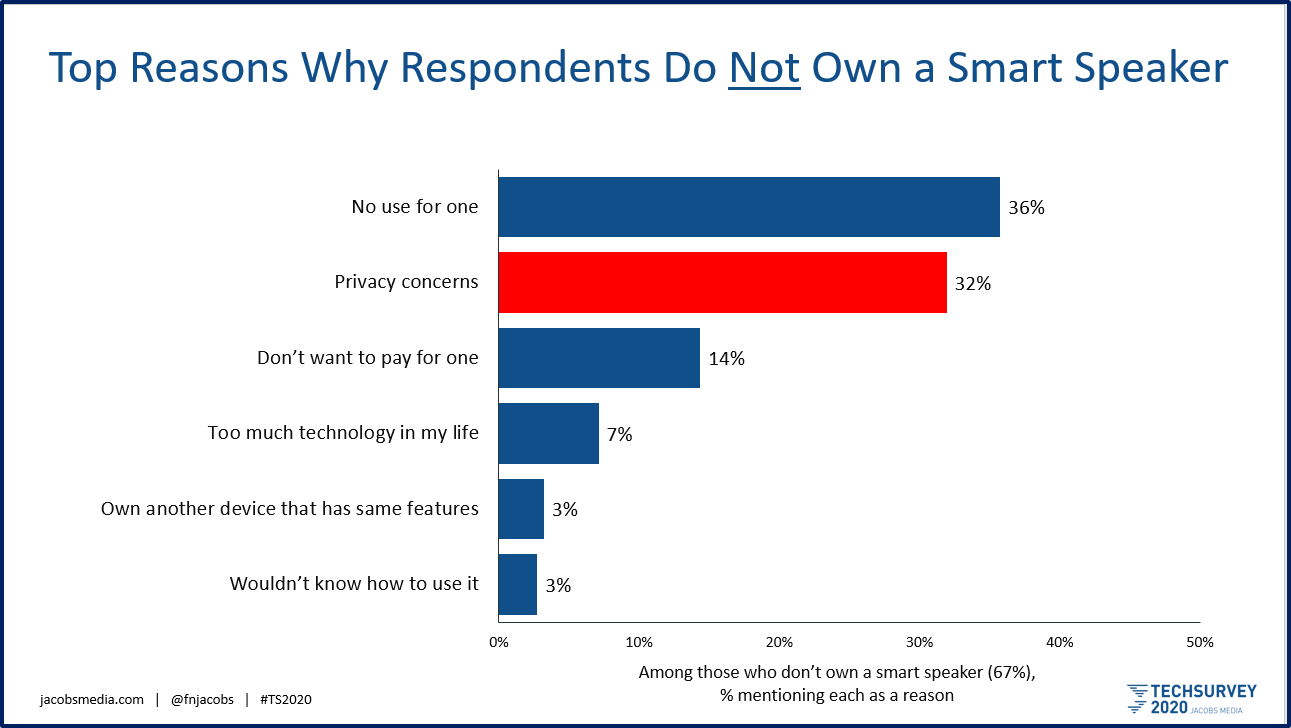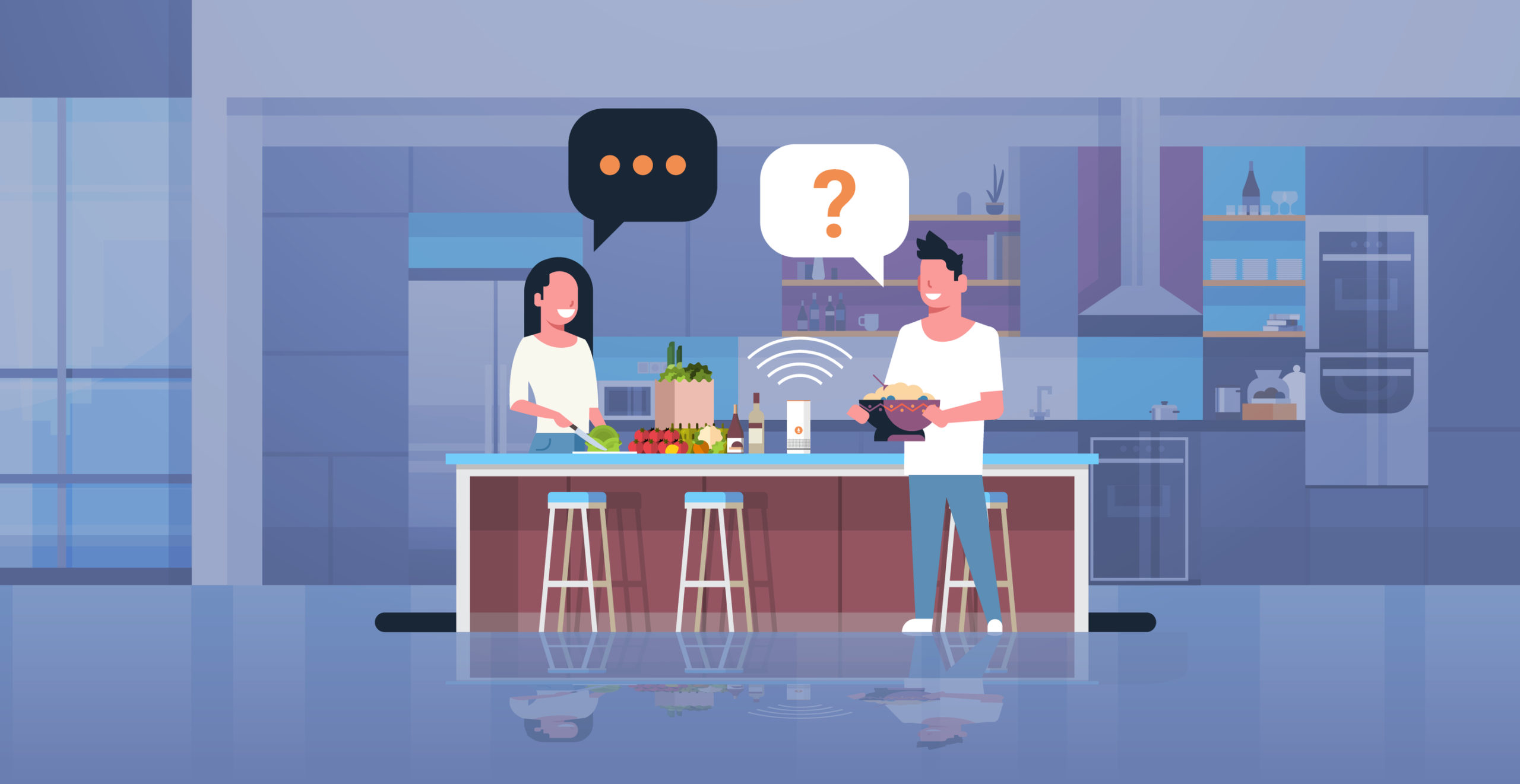
No doubt about it, smart speaker penetration continues to grow every year. We’ve been tracking the growth of these gadgets among core radio fans in our various Techsurveys. In our commercial radio study earlier this year, one in three respondents now owns one of these devices (up from 27% in 2019).
That’s robust and impressive, but there are signs smart speaker growth will be stunted – even hitting a wall at some point. The barriers have nothing to do with price – smart speakers are cheap, and these days, they’re often packaged in with other purchases or subscriptions.
SiriusXM recently ran a promotion for its subscribers – a $10 Echo Dot. Clearly, this was a response to the reduction in car use because of COVID. But it also  illustrates just how accessible these gadgets have become for the average consumer, even those at the lower end of the socioeconomic spectrum.
illustrates just how accessible these gadgets have become for the average consumer, even those at the lower end of the socioeconomic spectrum.
In the U.S., in particular, Amazon’s Alexa devices rule – by a large margin. In Canada and in most other countries, Google is dominant.
At CES these past few years, the collective “noise” generated by both companies has steadily amped up.
Owning “share of voice” is a major priority among both Amazon and Google. The company that controls more of this “real estate” will undoubtedly reap the benefits, because voice has clearly become the fuel that powers an increasing number of devices and software. And that trend is unlikely to abate.
And like many of the AM/FM radios that smart speakers are replacing, there are now numerous Alexa and Google Home devices in many homes – specifically, in living rooms, kitchens, and bedrooms.
So, what could possibly go wrong?
Unlike other connected gadgetry that has become ubiquitous in our lives, our homes, and in our cars, many consumers harbor a high degree of suspicion and even fear about the presence of smart speakers.
And this aversion, mostly for privacy reasons, could turn out to be the biggest impediment to growth and more widespread presence.
We have seen this phenomenon from the very beginning of the Alexa Movement. As reports – both substantiated and urban legend – came in about these devices “listening” to our conversations, a percentage of consumers pushed back on ever buying one. This, in spite of the fact that many own an array of other devices, from computers to smartphones to smart TVs – most of which also have built-in microphones and cameras.
But this “privacy problem” has stuck out like a sore thumb, stunting the growth of smart speakers. I had repeatedly heard this in focus groups, and decided to see if it would hold up in a statistical study. In Techsurvey 2020, conducted just before the COVID crisis hit, we asked the two-thirds of our massive sample without smart speakers to tell us the main reasons why they’ve chosen to go it alone – without Alexa or the Google Assistant:

Aside from those who say they simply have “no use for one,” the top speed bump revolves around privacy concerns, selected by nearly one in three non-owners of a smart speaker. As worries about web security – and privacy in general – have been amplified the past few years, you have to wonder how Amazon, Google, and other purveyors of voice platforms plan to address this obvious problem.
Every time there’s another story about how porous smart speakers can be with personal information, you have to believe it reinforces those who have made the choice not to bring a voice assistant into their homes or work spaces.
Some of them have been silly. You may recall that back in 2018 when “Alexa” stopped becoming a popular name for newborn girls, a story about random giggling incidents broke all over the media. I blogged about it at the time.
It was literally funny – the Echo would apparently start laughing for no apparent reason. But for many people, there was nothing funny about a device that was tuning in on all your conversations.
Twitter: “Amazon’s Alexa is acting up and spontaneously laughing for no reason.”
Most people: “Just a malfunction.”
Me: “GHOSTS!!” 👻
— Jonny Loquasto (@JQuasto) March 7, 2018
That snafu may have been relatively harmless, but it added to the anecdotal evidence consumers collect about what’s OK – and what’s not. At the core, we have to trust the technology in our lives, especially the gadgets we willingly bring into our safe places, our sanctums, our personal spaces.
Another more serious speed bump was reported by MediaPost last week. Reporter Laurie Sullivan revealed how Check Point researchers discovered a “gaping hole” in Amazon’s Alexa platform with the potential to leak customer data.
 The culprit is apparently certain Amazon skills being vulnerable to hackers. And according to Sullivan, Google isn’t off the hook either. A similar breach was discovered early this year on its Google Voice browser.
The culprit is apparently certain Amazon skills being vulnerable to hackers. And according to Sullivan, Google isn’t off the hook either. A similar breach was discovered early this year on its Google Voice browser.
These stories haven’t abated since the advent of smart speakers, and they raise the specter of doubt about whether these devices specifically, and the voice platform in general, can realistically become part of our mainstream lives.
It clearly has slowed down adoption and usage rates. It wasn’t that long ago that respected analytics firms were making heady predictions about voice. Comscore was perhaps most aggressive, suggesting that by the end of 2020, half of all searches would be conducted via voice.
We’ve still got several months to ago before we ring in a new year, but it would seem intuitive that like so many other things about 2020, things did not go as planned. Similarly, Gartner predicted that by the end of this year, three in ten searches would be done on devices without a screen.
Not meant to be. And this skepticism about smart speakers plays a role in the reluctance to bring an Alexa or Google Home into one’s domain.
The 800 pound gorilla in the room turns out to be a small device that typically weighs just a few ounces. Yet, many consumers perceive them as  dangerous and threatening.
dangerous and threatening.
For Amazon and Google in particular – the tech companies with the most to lose in this drag race – the only way over the privacy hump may be to address the problem head-on, installing safeguards and other protective technology that assuages consumer concerns.
These days, people may be even more loathe to complicate their already complicated lives with a technological “virus” that may not be good for them.
“Alexa, stop listening to my conversations!”
- What To Do If Your Radio Station Goes Through A Midlife Crisis - April 25, 2025
- A 2020 Lesson?It Could All Be Gone In A Flash - April 24, 2025
- How AI Can Give Radio Personalities More…PERSONALITY - April 23, 2025




I chuckle when I read about people’s privacy concerns. Do they really think Google and Amazon (and the government) don’t already know the intimate details of their lives? Dream on. Meanwhile, I love being able to tell my Google Home Mini (which I got for free) to play me nearly any radio station anywhere in the country–or abroad–with surprisingly good audio. No static at all. (But I still have a receiver in just about every room of my house because, well, Radio!)
Interesting “take” on this, John. But for every one of you (and me) who learned a long time ago we have no privacy, there are apparently two others who are still clinging to the fantasy that not having Alexa or Google Home on their kitchen island is somehow protecting their privacy. It is definitely a matter of perception IS reality. Thanks for the comment.
I agree with John. If people were so concerned about their privacy, they wouldn’t spend so much time on Facebook. Facebook tracks and sells your information a thousand times more than any smart speaker ever could. I think it’s partly an issue of technology advancing faster than most people’s understanding of the technology itself.
Christopher, I think you’re right. But it also supports the fact people love conspiracy theories – even when they’re about a gadget.
For anyone with privacy concerns, there’s a mute button atop the Amazon Echo.
Most people forget it exists, Ron. Or they hate the inconvenience of having to turn it off before asking Alexa to “shuffle songs by Steely Dan.”
I have two Google devices. One in the bathroom and one in the kitchen and one Amazon Fire Cube (which I absolutely hate). In the kitchen I mostly use google home as a timer for cooking. “Hey Google set a timer for ten minutes.” It’s the most high tech cooking timer I’ve ever owned. Occasionally I will ask it to play a radio station. As far as being able to listen to stations all across the country, I tried that and came to the conclusion that they all pretty much sound the same. So I listen to NPR or the local talk station. (I like to listen to people talking) I do wish the Google devices had Plex integration, as that’s where my music lives. I refuse to pay ten bucks a month to a streaming service. The device in the bathroom is to listen to the news while I wake my ass up in the shower. They do, from time time, spout wacky stuff in the middle of the night. “I don’t understand that” or “the relative distance between here and there is a blah blah…” So it’s obvious they are always listening. With google set a timer and when it goes off just say “stop” it will shut off, you don’t have to say ‘ok google’ yea it’s always listening.
Like a new member of the household, it can take a little getting used to when you first bring a smart speaker into your home – and your life. It can be a bit trial and error, as you note, John. It’s easier than housebreaking a dog, but ultimately a lot less satisfying. Thanks for your “real life” experience.